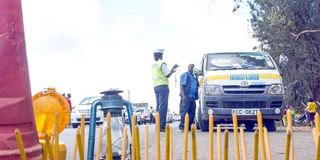Premium
Police confused on order to remove all roadblocks

A police officer interrogates a matatu driver at a roadblock in Nairobi on April 19, 2019. PHOTO | FILE | NATION MEDIA GROUP
What you need to know:
- Initially, the roadblocks were mounted at exit points to prevent movement of people in and out of Nairobi and Mombasa as well as on various roads across the country at night.
- Roadblocks have become one of the characteristic features of the restrictions on movement laws in the fight against the coronavirus.
An order given to the Kenya Police Service to remove all roadblocks is sowing confusion within its ranks and especially among officers who are supposed to enforce the night curfew.
While Inspector-General Hillary Mutyambai has never hidden his disdain for roadblocks due to their notorious reputation as avenues for collecting bribes, they have since March become a necessary tool in enforcing restrictions on movement.
Initially, the roadblocks were mounted at exit points to prevent movement of people in and out of Nairobi and Mombasa as well as on various roads across the country at night.
This, according to the government, was supposed to prevent people from moving about at night and travel between Nairobi and Mombasa, two cities that had emerged as the epicentres for coronavirus.
However, ever since the lifting of the cessation of movement orders last week, roadblocks have been restricted to being installed at night. This is because the 9pm to 4am countrywide curfew was extended for 30 more days by President Uhuru Kenyatta up to August 6.
TRAFFIC CHECKS
But in what is likely to cause a challenge on how the curfew will be effected, Deputy Inspector General Edward Mbugua has ordered all roadblocks to be removed.
In a toughly worded letter to his juniors, Mr Mbugua has noted that police bosses had taken advantage of the fight against Covid-19 to reintroduce static traffic checks which was against Mr Mutyambai’s policy.
“I am disappointed with some of you as you have reintroduced static traffic checks. It does not require rocket science to know the motive. It is simply to engage in corrupt practices for the commander and deployed benefit,” said Mr Mbugua to all Regional Police Commanders on July 3.
“I take this opportunity to warn you to immediately rescind the said transfers otherwise appropriate action will be taken against the defaulters,” warned the DIG.
Roadblocks have become one of the characteristic features of the restrictions on movement laws in the fight against the coronavirus. But aside from limiting the movement of people, they have also become a symbol of how corruption has aided the spread of the virus.
Private cars which had illegally been turned into Public Service Vehicles were charging an extra Sh1,000 per passenger which was to be paid at roadblocks in order to let travellers pass. In other areas, boda-boda operators had made an arrangement with officers at roadblocks that would allow them to assist passengers to cross.
CORRUPTION
So bad has been the level of bribery that, at some point, Mr Mutyambai personally led a raid on a roadblock at Blue Post Hotel on the Thika superhighway on June 19, during which police arrested 64 people.
But, with road blocks now ordered removed, it remains to be seen how the night curfew will be effected. The Nation on a spot-check over the weekend in Nairobi found the roadblocks missing at their usual spots along Lang'ata Road, Nyayo Stadium, in Chiromo on Waiyaki Way, at Garden City on Thika Road, Manyanja Road and Ngong Road.
Sub-county commanders who spoke on condition of anonymity because they don’t want to contradict they bosses said the new regulation was posing a challenge in enforcing the curfew in their areas.
“It is very tricky because you cannot stop a moving vehicle unless you put spikes on the road. It is the same way drunk drivers were allowed back on the road in December when alcoblow was removed,” said one Sub County Commander.
“The officers who were on these duties have been re-deployed to carrying out patrols because Kenyans cannot stay at home at night unless they see a police officer,” said another sub-county commander.
However while the road blocks have gone away, at least for now, past trends on this matter show that they always find a way back on the roads. In February, Mr Mutyambai ordered a similar removal of all roadblocks on the roads saying police officers will be restricted to controlling traffic in towns.
He said that traffic officers will all be mobile and the static ones be deployed in towns and major cities. This declaration, like the previous ones, also failed to hold.
“I have warned my officers against arresting motorists and locking them up in police stations for committing minor traffic offenses. They should either be released on cash bail or issued notices to appear in court,” warned Mr Mutyambai.





